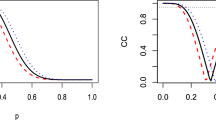Abstract
This paper considers an application of work on probabilistic measures of coherence to inference to the best explanation (IBE). Rather than considering information reported from different sources, as is usually the case when discussing coherence measures, the approach adopted here is to use a coherence measure to rank competing explanations in terms of their coherence with a piece of evidence. By adopting such an approach IBE can be made more precise and so a major objection to this mode of reasoning can be addressed. Advantages of the coherence-based approach are pointed out by comparing it with several other ways to characterize ‘best explanation’ and showing that it takes into account their insights while overcoming some of their problems. The consequences of adopting this approach for IBE are discussed in the context of recent discussions about the relationship between IBE and Bayesianism.
Similar content being viewed by others
References
Bonjour L. (1985). The structure of empirical knowledge. Harvard University Press, Cambridge, Mass
Bovens L., Olsson E.J. (2000). Coherentism, reliability and Bayesian networks. Mind 109:685–719
Bovens L., Hartmann S. (2003a). Solving the riddle of coherence. Mind 112:601–633
Bovens L., Hartmann S. (2003b). Bayesian epistemology. Oxford University Press, Oxford
Chajewska, U., Halpern, J. Y. (1997). Defining explanation in probabilistic systems, Proceedings of the 13th Conference on Uncertainty in AI, 62–71.
Fitelson B. (2003). A probabilistic theory of coherence. Analysis 63:194–199
Glass D.H. (2002). Coherence, explanation and Bayesian networks. In: O’Neill M., Sutcliffe R.F.E et al. (eds) Artificial intelligence and cognitive science. Springer-Verlag, Berlin Heidelberg New York, Lecture Notes in Artificial Intelligence, 2464, 177–182
Glass D.H. (2005). Problems with priors in probabilistic measures of coherence. Erkenntnis 63:375–385
Harman G. (1965). The inference to the best explanation. The Philosophical Review 74:88–95
Hempel C.G. (1965). Aspects of scientific explanation. Free Press, New York
Ladyman J., Douven I., Horsten L., van Fraassen B. (1997). A defence of van Fraassen’s critique of abductive reasoning: reply to Psillos. The Philosophical Quarterly 47:305–321
Lewis C.I. (1946). An analysis of knowledge and valuation. Open Court, LaSalle
Lipton P. (2001). Is explanation a guide to inference? A reply to Wesley C. Salmon. In: Hon G., Rakover S.S. (eds) Explanation: Theoretical approaches and applications. Kluwer, Dordrecht, pp. 93–120
Lipton P. (2004). Inference to the best explanation (2nd ed.). Routledge, London
Meijs W. Douven I. (2005). Bovens and Hartmann on coherence. Mind 114:355–363
Okasha S. (2000). Van Fraassen’s critique of inference to the best explanation. Studies in the History and Philosophy of Modern Science 31(4):691–710
Olsson E.J. (2002). What is the problem of coherence and truth? The Journal of Philosophy 99(5):246–272
Olsson E.J. (2005). Against coherence. Oxford University Press, Oxford
Pearl J. (1988). Probabilistic reasoning in intelligent systems. Morgan Kaufman, San Mateo
Popper K. (1959). The Logic of Scientific Discovery. Hutchinson, London
Psillos S. (1996). On van Fraassen’s critique of abductive reasoning. The Philosophical Quarterly 46:31–47
Psillos S. (1997). How not to defend constructive empiricism: A rejoinder. The Philosophical Quarterly 47:369–372
Psillos S. (1999). Scientific realism: How science tracks truth. Routledge, London
Psillos S. (2002). Simply the best: A case for abduction. In: Sadri F., Kakas A. (eds) Computational logic: From logic programming into the future. Springer-Verlag, Berlin Heidelberg New York, Lecture Notes in Artificial Intelligence, 2408, 605–625
Psillos S. (2004). Inference to the best explanation and Bayesianism. In: Stadler F. (ed) Induction and deduction in the sciences. Kluwer, Dordrecht, pp. 83–91
Psillos S. (2006). Thinking about the ultimate argument for realism. In: Cheyne C., Worrall J. (eds) Rationality and reality: conversations with Alan Musgrave. Kluwer, Dordrecht
Salmon W.C. (1989). Four decades of scientific explanation. University of Minnesota Press, Minneapolis
Salmon W.C. (1998). Causality and explanation. Oxford University Press, Oxford
Salmon W. C. (2001). Reflections of a bashful Bayesian: a reply to Peter Lipton. In: Hon G., Rakover S.S. (eds) Explanation: Theoretical approaches and applications. Kluwer, Dordrecht, pp. 121–136
Shimony S. (1994). Finding maps for belief networks is NP-hard. Artificial Intelligence 68:399–410
Shogenji T. (1999). Is coherence truth-conducive? Analysis 59:338–345
Thagard P. (1989). Explanatory Coherence. Behavioral and Brain Sciences 12:435–467
Thagard P. (2000). Probabilistic networks and explanatory coherence. Cognitive Science Quarterly 1:93–116
Van Fraassen B.C. (1980). The scientific image. Clarendon Press, Oxford
Van Fraassen B.C. (1989). Laws and symmetry. Clarendon Press, Oxford
Author information
Authors and Affiliations
Corresponding author
Rights and permissions
About this article
Cite this article
Glass, D.H. Coherence measures and inference to the best explanation. Synthese 157, 275–296 (2007). https://doi.org/10.1007/s11229-006-9055-7
Published:
Issue Date:
DOI: https://doi.org/10.1007/s11229-006-9055-7




